
You’re grabbing your morning coffee, your phone automatically connects to the café’s “Free WiFi,” and you quickly check your bank balance while waiting in line.
Congratulations – you just rolled out the red carpet for cybercriminals.
I know what you’re thinking. “Come on, everyone uses public WiFi. What’s the big deal?”
Here’s the big deal: 33.3 million smartphone attacks were prevented in 2024 alone. That’s not a typo. And the scariest part? Most of these attacks succeeded because of simple habits we do every single day.
The One Habit That Makes Security Experts Lose Sleep
Let me be blunt: Using public WiFi is like having a conversation in a crowded room full of strangers with excellent hearing.
Every cybersecurity expert I’ve researched – from Kaspersky to the FBI – agrees on this one thing. Public WiFi is the #1 most dangerous phone habit you can have.
Think about it. When you connect to that coffee shop network, here’s what happens:
Your phone starts broadcasting everything. Your passwords. Your messages. Your banking details. It’s all flowing through a network that anyone nearby can monitor.
40% of people have already had their information stolen through public WiFi. Yet we keep doing it because, let’s face it, we need our internet fix.
The Fake Hotspot Trap
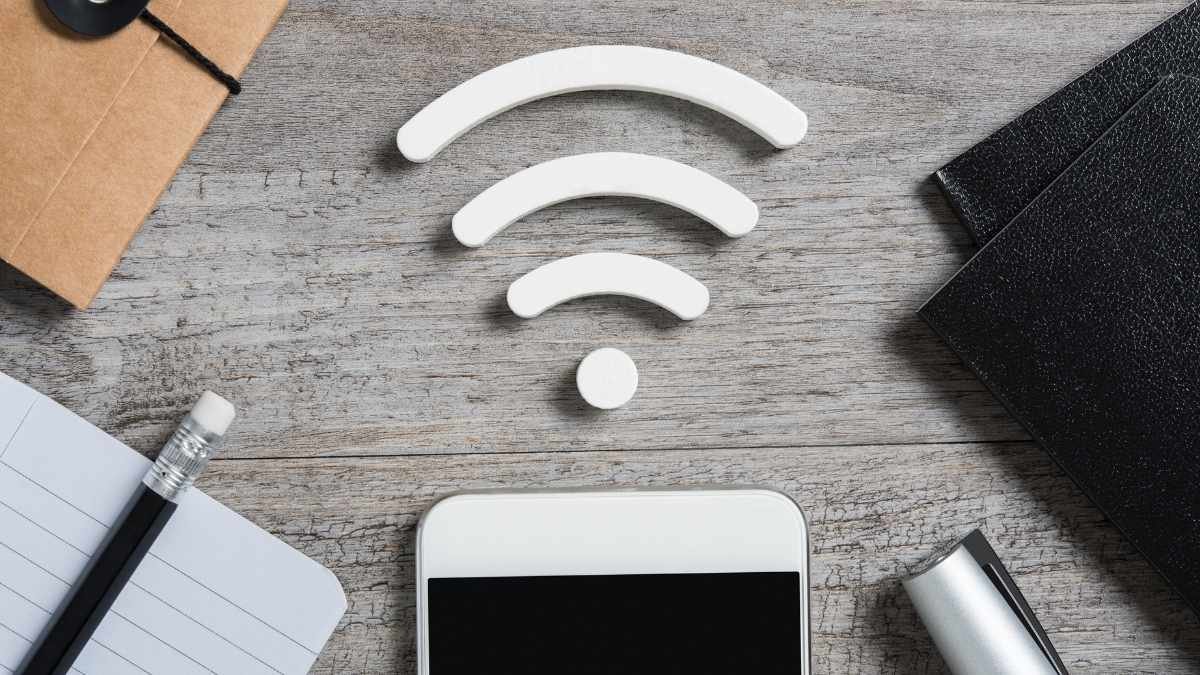
Here’s something that’ll give you chills: hackers create fake WiFi networks that look legit.
You see “Coffee_Shop_WiFi” and “Coffee-Shop-Guest” listed. Which one’s real? Plot twist – neither. Both were set up by someone with a laptop in the corner, just waiting for you to connect.
Once you’re on their network, they can see everything. And I mean everything.
Your Password Problem is Worse Than You Think
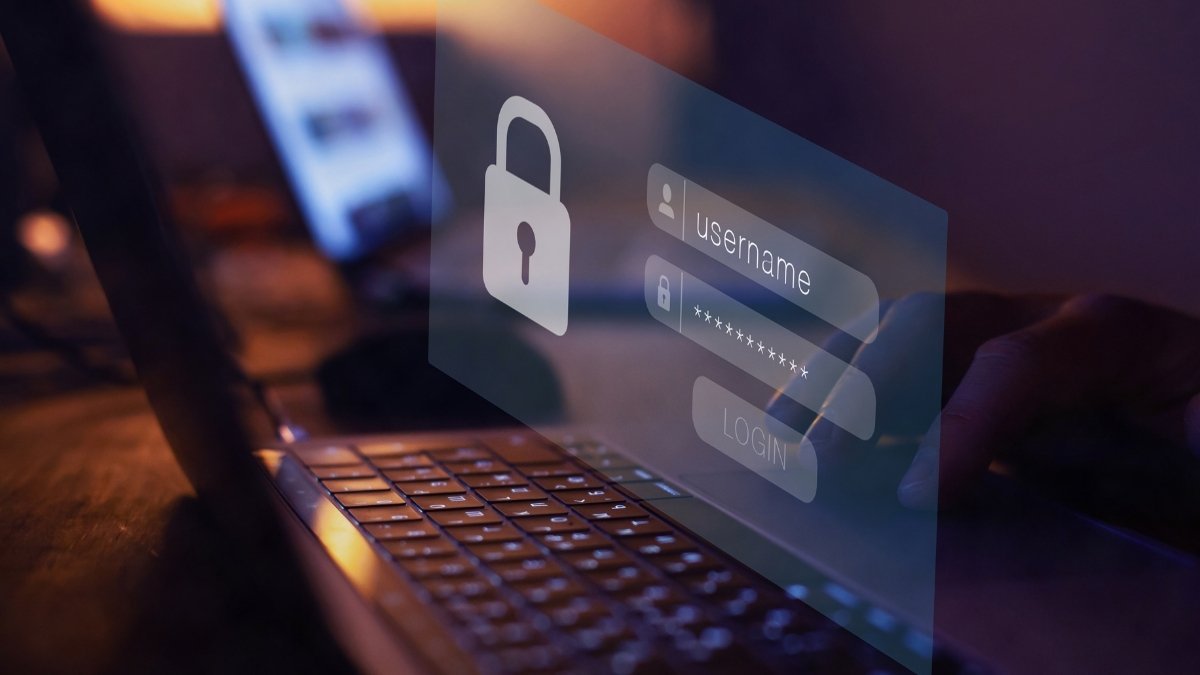
“I use strong passwords!”
Sure, you do. But tell me honestly – do you use the same password for your banking app and your Netflix account?
Google’s security team puts it perfectly: “Reusing passwords creates a dangerous domino effect.”
Here’s how it works in real life:
Let’s say you use the same password for your favorite shopping site and your bank. That shopping site gets hacked (happens all the time). Now hackers have your email and password combo.
First thing they do? Try that same combo on every major bank website.
Boom. Your life savings just became their vacation fund.
The scary stats? Credential-based attacks jumped 703% in 2024. That means hackers aren’t even trying to break into systems anymore – they’re just using the passwords we’ve accidentally given them.
The “I’ll Update Later” Mentality That’s Costing People Everything
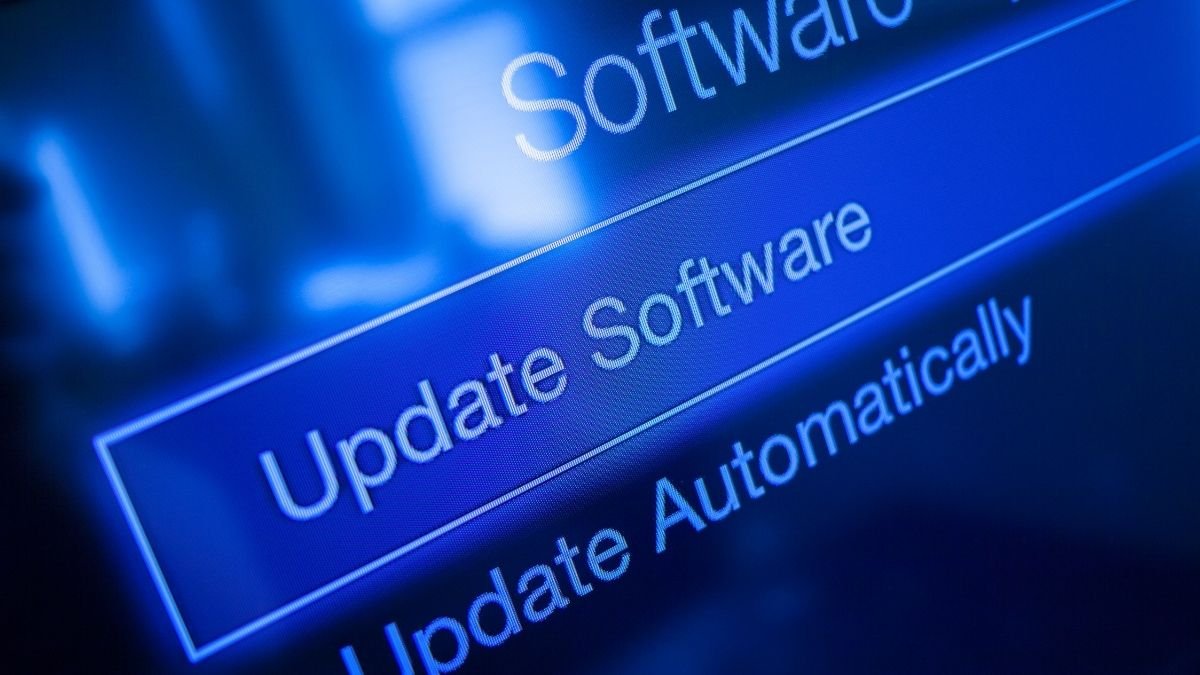
Raise your hand if you’ve ever seen that “Software Update Available” notification and thought, “Ugh, not now.”
Everyone’s hand goes up.
I get it. Updates are annoying. They take time. They change things you’re used to.
But here’s what you’re doing: leaving your front door unlocked in a bad neighborhood.
60% of data breaches happen because someone didn’t install a simple security update. These aren’t complicated fixes. They’re one-tap solutions to problems that could cost you thousands.
Think of it this way: your phone company found a hole in your security, fixed it, and handed you the patch. Ignoring it is like a locksmith telling you, “Hey, your lock is broken, here’s a new one,” and you saying, “Nah, I’m good.”
The New Breed of Mobile Attacks That Sound Like Science Fiction
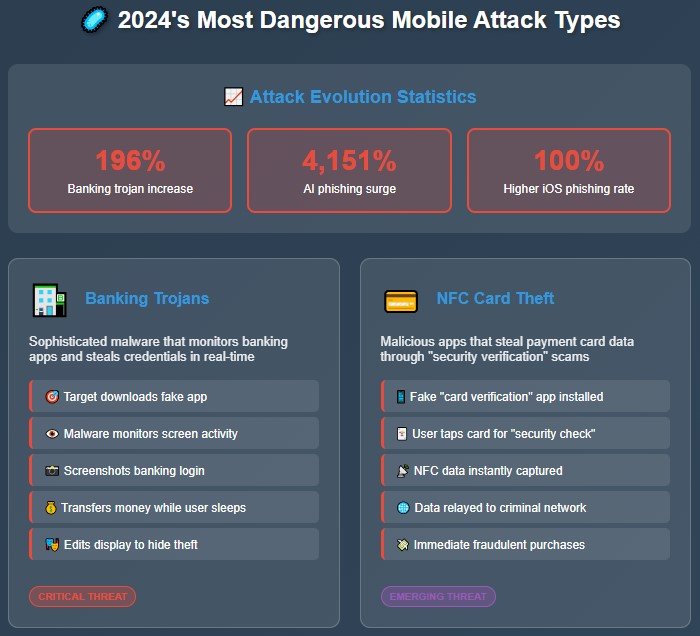
Remember when phone viruses were just annoying pop-ups? Those days are long gone.
Banking Trojans That Empty Your Account While You Sleep
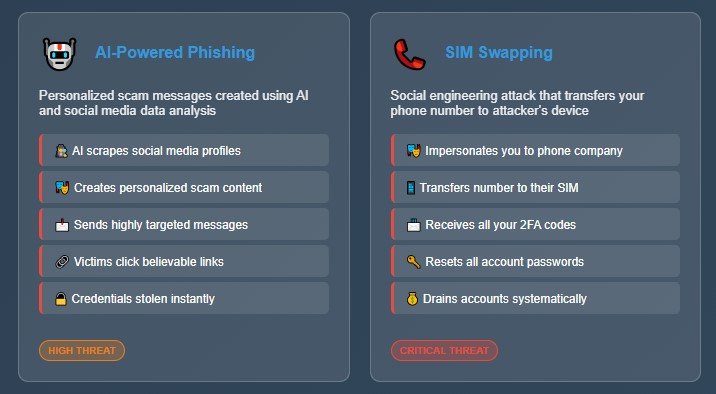
Banking attacks on smartphones exploded by 196% in 2024. These aren’t your grandpa’s computer viruses.
Modern banking trojans are like having a skilled thief standing right behind you, watching everything you do. They wait patiently until you open your banking app, then they take screenshots, record your keystrokes, and quietly transfer your money while you’re sleeping.

The worst part? Your bank statements look normal because the malware edits what you see on your screen.
The Credit Card Scam That Uses Your Phone’s NFC

This one’s brand new and wild.
Scammers create fake apps that claim to “verify your credit card security.” They convince you to tap your card against your phone “for verification.”
What happens? The app steals your card data instantly and sends it to criminals who use it for immediate purchases. Hundreds of thousands of people have already fallen for this.
It’s like someone asking to “check if your wallet is real” and you hand it over to a pickpocket.
AI-Powered Phishing That Knows Your Mom’s Name

Here’s where things get creepy. Phishing attacks increased by 4,151% since ChatGPT became popular.
These aren’t the obvious “Nigerian Prince” emails anymore. AI now creates personalized scam messages using information scraped from your social media.
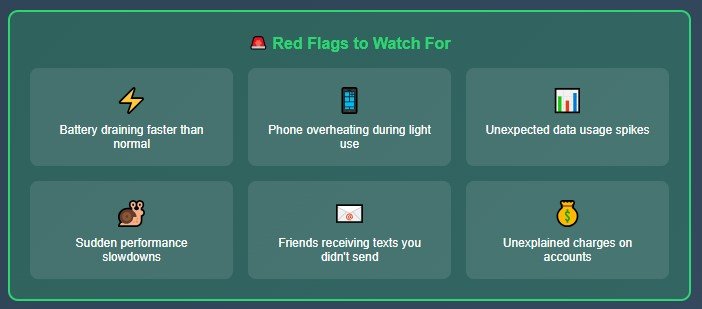
Getting a text that says: “Hey [Your Name], your mom [Mom’s Name] asked me to send you this link about [something you recently posted about]. Hope you’re enjoying your vacation in [place you just checked in]!”
Would you click? Most people do.
The Real Cost of Bad Phone Habits
Let’s talk numbers that’ll make your stomach drop.
Total cybercrime losses hit $16.6 billion in 2024. That’s billion with a B.
But forget the big numbers for a second. Let’s talk about real people:
- A T-Mobile customer lost $33 million to SIM swap fraud
- A Colorado resident watched $24,500 disappear from Wells Fargo
- A Florida victim lost $68,000 in life savings to a Citibank hack
These aren’t celebrities or CEOs. These are regular people whose phone habits made them targets.
SIM Swapping: The Nightmare You’ve Never Heard Of
Here’s a terrifying statistic: SIM swap fraud exploded 1,055% in the UK during 2024.
What’s SIM swapping? Criminals call your phone company, pretend to be you, and convince them to transfer your phone number to their device.
Suddenly, every text message, every two-factor authentication code, every “forgot password” link goes to them instead of you.
They’re you, as far as your phone is concerned.
Surprising Facts That’ll Change How You Think About Phone Security
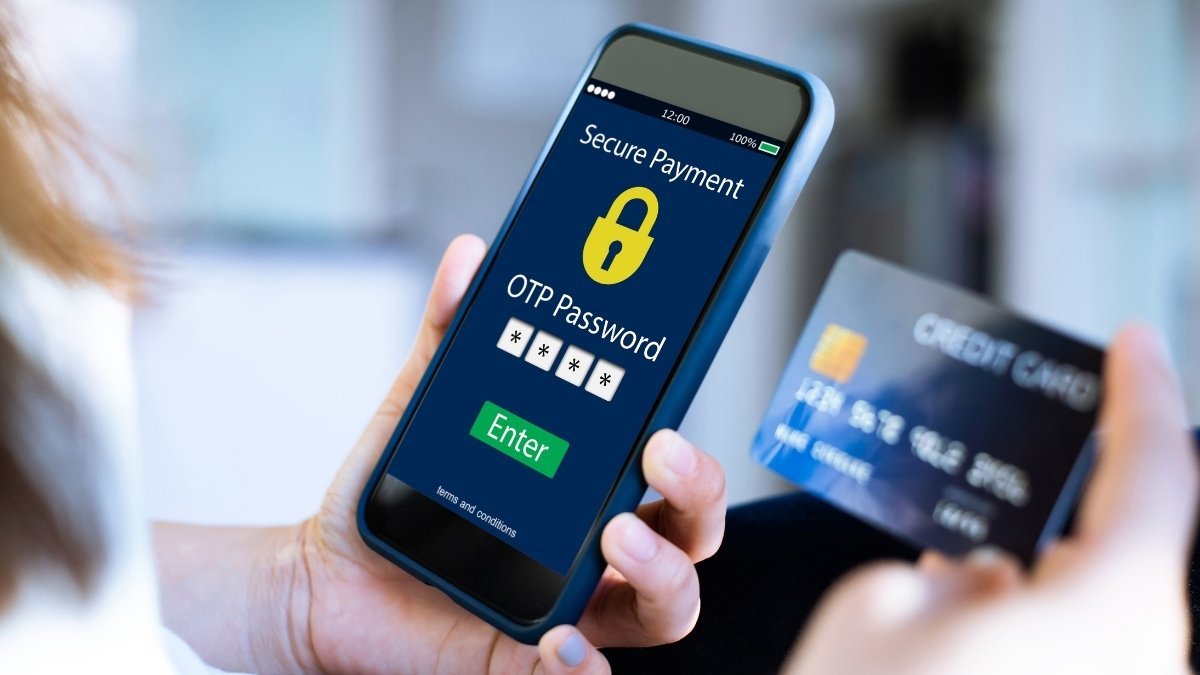
iPhone Users Get Hit by More Phishing Than Android Users
Plot twist: iOS users encounter twice as many malicious websites compared to Android users.
Wait, what? Isn’t iPhone supposed to be more secure?
Here’s the thing – iPhone users often have a false sense of security. They think Apple’s “walled garden” protects them from everything, so they’re less careful about what they click.
Android users, knowing they need to be more cautious, actually are.
Your Pattern Lock is Useless
Those fancy pattern locks everyone loves? They can be cracked by looking at the smudges on your screen.
Seriously. The oils from your finger leave a visible trace of your pattern. Someone with decent eyesight can figure it out in seconds.
Even worse, people often use patterns that spell words or follow obvious shapes. “L” patterns, squares, their initials – it’s like using “password123” but with finger movements.
Government Officials Are Panicking (And You Should Too)
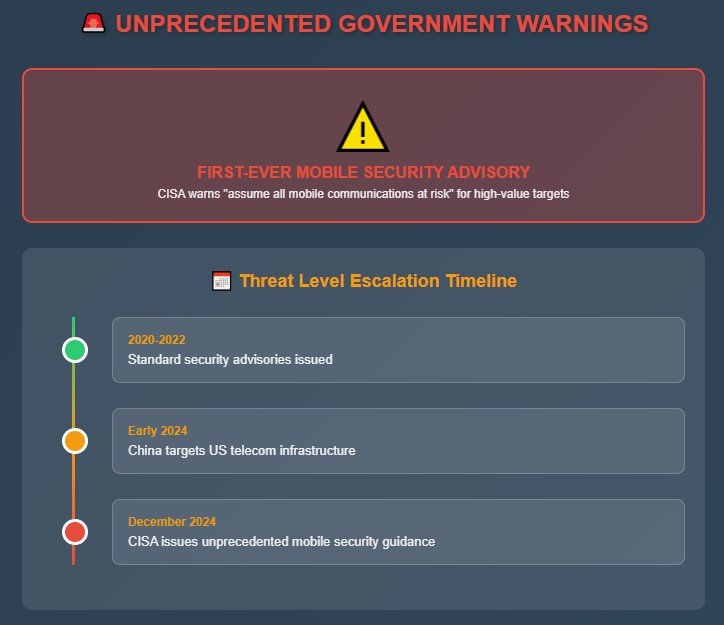
In December 2024, CISA (the US government’s cybersecurity agency) issued an unprecedented warning about mobile security.
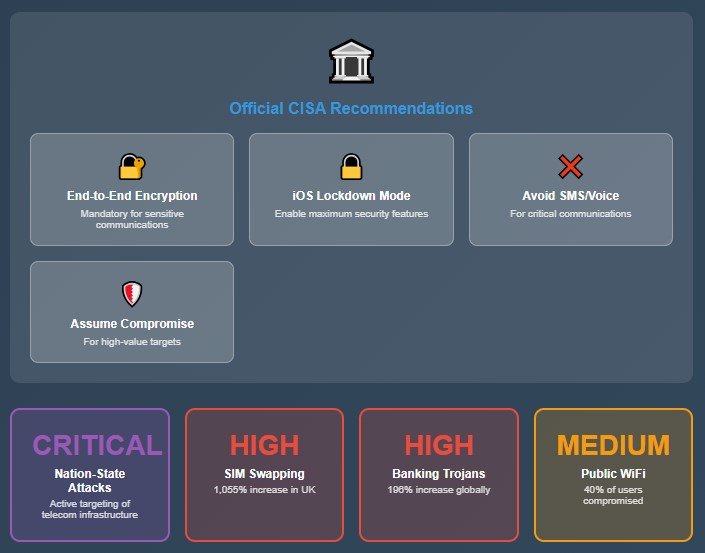
They said: “If you’re important enough, assume your phone is completely compromised.”
Think about that. The people whose job it is to protect America’s digital infrastructure are telling high-value targets to assume their phones are already hacked.
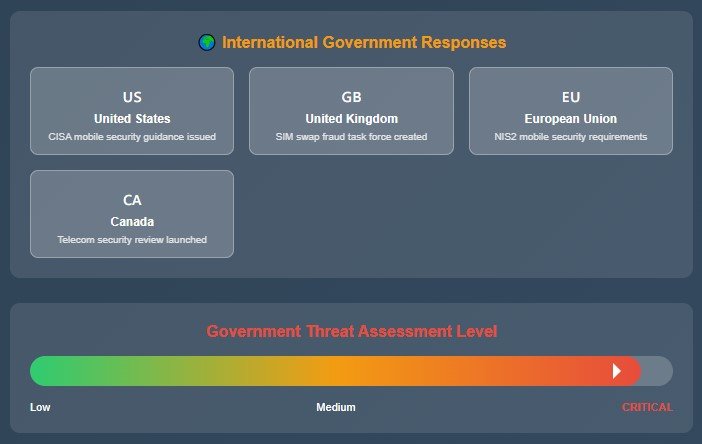
If that doesn’t wake you up, I don’t know what will.
How to Stop Being an Easy Target (Starting Right Now)
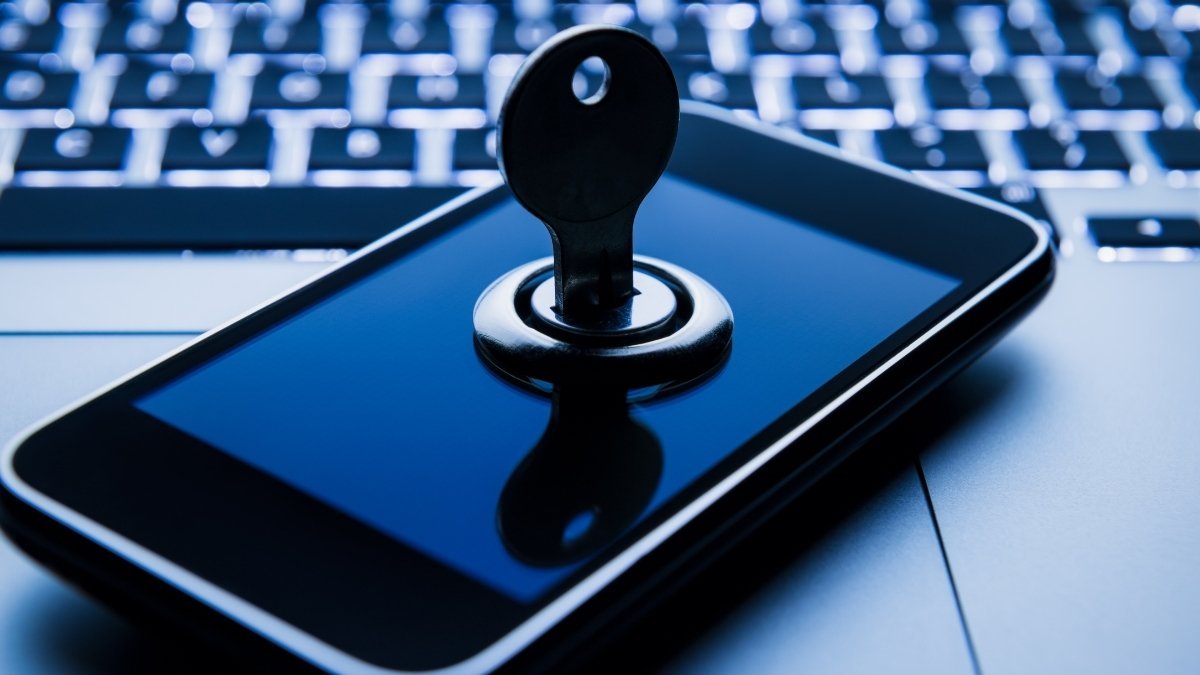
Okay, enough doom and gloom. Let’s fix this.
Kill the Public WiFi Habit Forever
I’m not saying never use public WiFi. I’m saying never use it for anything that matters.
Checking the weather? Fine. Logging into your bank account? Not.
When you need internet in public:
- Use your phone’s hotspot feature instead
- Invest in a VPN (Virtual Private Network)
- Turn off auto-connect for WiFi networks
- “Forget” every public network after using it
Fix Your Password Problem Today
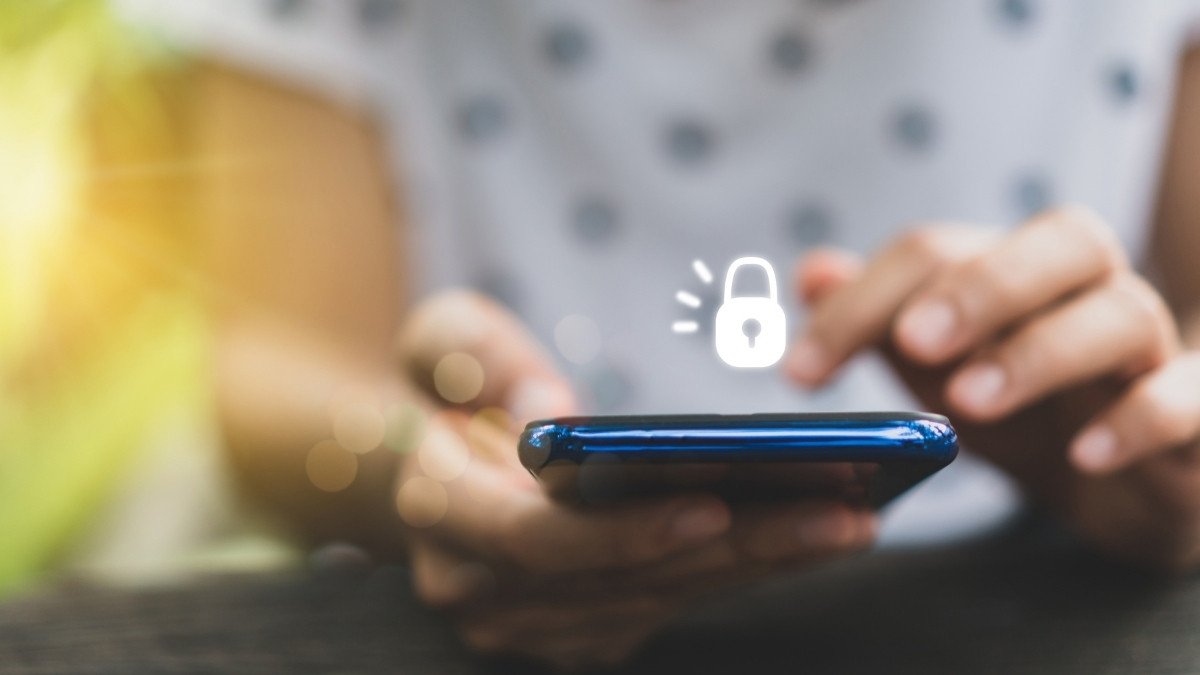
Stop reusing passwords. Yes, it’s annoying to remember different ones. That’s what password managers are for.
Google’s security team says, “Adding a second step of verification can stop 100% of automated bot attacks.”
But here’s the catch – don’t use SMS for two-factor authentication. Remember SIM swapping? Use an authenticator app instead.
Embrace the Update Life
I know, I know. Updates are boring.
But here’s how to think about it: Every update you skip is like leaving a “Rob Me” sign on your digital front door.
Turn on automatic updates for everything:
- Your phone’s operating system
- Every app you use
- Your browser
- Security software
Set it once, forget about it, stay protected.
Be Paranoid About App Downloads
Only download apps from official stores. Period.
Even then, read the reviews. Look at what permissions the app wants. If a flashlight app wants access to your contacts and location, run away.
75% of mobile apps contain at least one security vulnerability. Don’t make it easy for the bad guys.
The Future is Coming (And It’s Not Pretty)

Here’s what security experts are preparing for:
AI-driven attacks are expected to increase by 45% next year. Zero-click malware (the kind that doesn’t need you to click anything) is projected to double.
The bad guys are getting smarter, faster, and more creative.
But here’s the thing – most attacks still succeed because of basic human habits. The fancy AI attacks get the headlines, but the simple stuff still works.
Your Phone Security Starts With You
Here’s what legendary hacker-turned-security-expert Kevin Mitnick taught us: “The weakest link in the security chain is the human element.”
Technology can’t save you from bad habits.
Your phone can have the best security features in the world, but if you connect to sketchy WiFi, reuse passwords, and ignore updates, you’re still an easy target.
The good news? Fixing these habits is easier than you think.
The bad news? Every day you wait is another day you’re vulnerable.
Take Action Today (Your Future Self Will Thank You)
Don’t let this be another article you read and forget. Pick one thing from this list and do it right now:
- Check your WiFi settings – remove any public networks you’ve saved
- Download a password manager – start with the free version of any major one
- Turn on automatic updates – spend 5 minutes in your settings
- Enable two-factor authentication – start with your most important accounts
- Review your app permissions – delete anything suspicious
Your phone holds your entire digital life. Your photos, your money, your conversations, your work, your relationships.
The question isn’t whether you’ll be targeted – it’s whether you’ll be prepared when it happens.
The choice is yours. Stay vulnerable with convenient bad habits, or spend a few minutes making yourself a much harder target.
Trust me, hackers are counting on you choosing convenience over security.
Prove them wrong.






